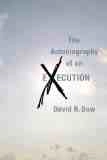Non-Fiction Reviews
Book Review: The Autobiography of an Execution by David R. Dow

- The Autobiography of an Execution
- Twelve, 288 pp.
Always Hopeful but Never Optimistic
In one passage of the book under review, author David R. Dow describes himself as “bookish, plodding and unforgiving,” and in another as “short-tempered and surly and altogether unpleasant to be around.” Some readers of his book might be tempted to add to Dow’s list still more adjectives: intransigent, ungenerous, narrow-minded, inconsistent, judgmental, impatient and at times spectacularly insensitive. When a meeting with a potential client does not proceed as he would have it, Dow – a Texas defense lawyer for prisoners facing the death penalty – is not above cutting it short and telling the inmate, “Have a nice life, asshole.”
Thankfully, Dow is not without redeeming qualities. He is above all funny, and there is something engaging about his willingness to describe his weakest points so thoroughly. The best thing about his memoir, The Autobiography of an Execution, is that he doesn’t take the slightest trouble to pretend that defending death-penalty clients – who are usually indigent, uneducated, and often mentally ill; in short, among the most vulnerable members of society and as such the most deserving of a defense – even vaguely qualifies him for sainthood.
In this sense, Dow’s book reminded me of Art Spiegelman’s haunting graphic memoir, Maus: A Survivor’s Tale, about his own father, a victim of the Nazis who endured Auschwitz. In that book, Spiegelman paints his father as similarly obstinate and prejudiced. Both books are reminders that a heroic experience doesn’t necessarily make someone into a hero, although it sometimes highlights his humanity.
At 250 pages, The Autobiography of an Execution is a breezy, fast-paced read, unstructured but absorbing. Dow intersperses the tales of various of his cases with war stories about incompetent colleagues, corrupt lying police, judges who are hardly impartial and one prosecutor who may have had the hots for him. He also goes into great detail about his coping strategies and how he stays more or less grounded despite such intense and often depressing work. These include spending quality time with his wife and infant son (although he admits he is too often neglectful of them) as well as cooking or going out to eat bountiful meals, lubricated by generous (some might say injudicious) allocations of bourbon.
Texas is the death penalty capital of the U.S., if not the world. Each year it tends to prosecute at least four times more capital cases than other states that are aggressive about the death penalty (including Florida, Georgia and Louisiana). Dow lays out his feelings about its system in the early pages of the book. He says he believes even criminals guilty of murder should be spared death. He writes:
I used to support the death penalty. I changed my mind when I learned how lawless the system is. If you have reservations about supporting a racist, classist, unprincipled regime, a regime where white skin is valued more highly than dark, where prosecutors hide evidence and policemen routinely lie, where judges decide what justice requires by consulting the most recent Gallup poll, where rich people sometimes get away with murder and never end up on death row, then the death-penalty system we have here in America will embarrass you to no end.
“Always hopeful but never optimistic,” Dow writes that he scrupulously tries to avoid encouraging any glimmer of hope for his clients. The book describes and explains why this may be a reasonable approach.
Defendants facing capital punishment always have multiple strikes against them, and their attorneys will most likely lose. Those defense lawyers are often inept and sometimes criminally negligent (there are cases in which they have actually slept through their clients’ trials). There are cases in which even though relatives of the victims have argued against death for the killers, judges and juries have ordered them executed anyway. Dow writes of a prison chaplain who tried to get his clients to drop their appeals, “expert” witnesses who repeatedly lie while giving testimony, and police who play by their own illegal rules. Dow writes, “Their philosophy seems to be, so far as I can tell, that they are the good guys fighting the forces of death and darkness, and that entitles them to break the rules when they think they need to and lie about it later when they deem it necessary.”
Dow is good at describing many of the idiosyncrasies and injustices of the capital punishment system. The difference between the clinical and legal definitions of mental illness has sent to their deaths many a defendant who by any stretch of the imagination is not playing with a full deck. Judges often deny the appeals of inmates who are evidently mentally sick; the most famous recent example is Ricky Ray Rector, put to death in 1992, who saved a slice of pecan pie, the dessert of his last meal, to be eaten later, after his execution.
One of the elements of capital defense work that most shocked me after I first became involved in it is that appeals based on legal incompetence, or even misconduct, are often denied. These are the trials that lawyers literally sleep through, or show up drunk for, denying their clients even the most basic defense. Even when such negligence is undeniably proven, and evidence worthy of an appeal is uncovered, the petition is often denied. “Deuteronomy trumps the Sixth Amendment every time,” writes Dow. He goes on that, even when a lawyer can demonstrate that, during a trial, “the constitution was violated every which way,” a judge is most likely to respond, “Yeah, but your client killed somebody, right?” – as if the U.S. justice system did not apply to those accused of murder.
There are also cases where people may die due to the callousness or arbitrary nature of the powers that be. Dow writes of a case in which his office made abundantly clear to the court that a document was going to be filed a few minutes late, due to a massive computer failure in the workplace. These moments made the difference between the life and death for his client.
In the introductory Author’s Note to The Autobiography of an Execution, Dow makes clear that he has played fast and loose with the facts of some of his cases, mixing them up and disguising identities in an effort to steadfastly respect attorney-client privilege (which is meant to last even after the deaths of the clients). In the age of made-up memoirs, I at first had a slight problem with this conceit. I found myself asking how “true” were the anecdotes of the book (whether or not they were factual).
For example, in an early passage Dow writes of the family member of a victim who, interviewed on TV by Katie Couric, said that she would prefer the murderer not be put to death. A fifteen-member parole board voted eight to seven in favor of the execution. The anecdote seemed terribly pat. Had he manipulated it? Yet Dow completes the story with a detail so spot-on about the families of the kind of people who end up on Death Row that I don’t believe he has the imagination to have made it up. He writes of the defendant, “I was going to be witnessing the execution with his brother and sister. He did not want his mother there, but he asked me to be sure to tell her that he loved her. He knew his brother would not convey the message.”
In the end, I had no trouble with the “ring of truth” aspect to The Autobiography of an Execution, and feel it is the most realistic depiction I have yet read of a death-penalty lawyer’s experience. My only real regret about the book is that the case that Dow writes about most amply is one in which the defendant was innocent. As Dow knows and states, this is the exception; most of them are guilty. Murderers are problematic and much harder to defend than the handful of the accused that are in fact blameless. Assassins are despised by a populace – both civilians and professionals – that, in this country, is bloodthirsty and vengeful. However, if we are to believe the principles of American justice, they are no less deserving of a defense, or of mercy, than the innocent.
***
David Lida is the author of several books, including First Stop in the New World: Mexico City, Capital of the 21st Century. As a mitigation specialist, he conducts investigations for defense attorneys on death-penalty cases. His website can be found at www.davidlida.com.
David Lida is a writer living in Mexico City. Pagina de Inicio






1 Comment
You must be logged in to post a comment Login